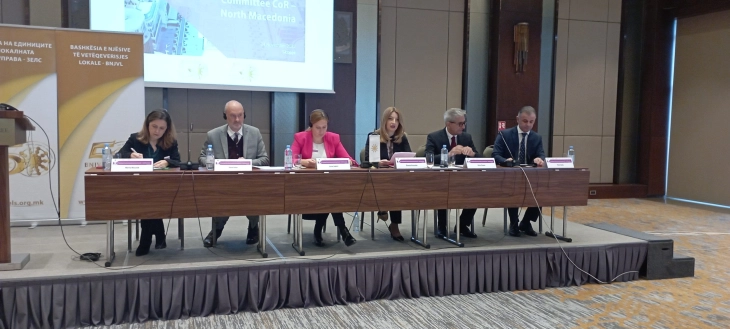ZELS requests separate section to assess progress of decentralization in N. Macedonia

Skopje, 24 November 2022 (MIA) – The most important part of this and the previous meeting in Brussels is the initiative by the Association of the Units of Local Self-Government (ZELS) for decentralization of power in North Macedonia to be assessed as a separate section during the country’s progress towards the EU. We call on the delegates of the European Committee of the Regions to support this initiative and ensure its speedy realization, said ZELS President and Skopje Mayor Danela Arsovska at the 20th meeting of the Joint Consultative Committee between Macedonia and the European Committee of the Regions on Thursday.
Arsovska said the main reason for this is the fact that decentralization of power in the country has been stagnating for a long time now, with attempts to centralize certain areas. Arsovska said there are multiple indicators for this.
“The first one is very relevant at this time. Municipalities in Macedonia are left completely on their own in dealing with the challenges of the energy crisis, without support for the proposals submitted by ZELS to the Government as early as January 2022,” said Arsovska.
The second indicator, said Arsovska, is that the set of changes, initiated by ZELS more than four years ago, which aimed to provide greater financial stability of the local government and changes in the organizational setup of the work of municipalities, are still in the initial phase of implementation.
“Only minor changes have been made, especially in the Law on Financing Local Self-Government Units, where greater responsibilities are imposed and there are no solutions for the situations in which the municipalities find themselves. Which is why ZELS insists that a separate section is added to assess Macedonia’s progress regarding the decentralization of power and the reforms in the local self-government system,” said Arsovska.
In response to a journalist’s question on whether they will be able to find a common position for the Government to help the municipalities overcome the crisis, Minister of Local Self-Government Risto Penov said the Government is analyzing the situation and taking measures accordingly.
“We expect the European funds to arrive next year, some of which to be allocated for the municipalities so that the citizens can get more from the municipal services,” said Penov.
Head of the EU Delegation to North Macedonia, Ambassador David Geer, stated it is important for the local authorities to play a crucial role in the EU accession process, because around 70 percent of the rules in the EU are implemented through the local authorities.
“The local authorities will play a key role and they must be a part of the discussions on the EU path,” stressed Geer.
The Joint Consultative Committee between Macedonia and the European Committee of the Regions was established in 2008 with the aim of laying the ground for EU enlargement by improving the political dialogue and cooperation between the Macedonian local authorities and the EU member states. The body holds meetings twice a year. The Joint Committee consists of 22 delegates, 11 of whom are representatives of North Macedonia (mayors and council members) and the other 11 are delegates from EU municipalities and regions.
Two panel discussions were held as part of the event, focusing on the country’s new steps on its EU path, the energy crisis and what Macedonian municipalities can do to tackle it. ad/ik/







